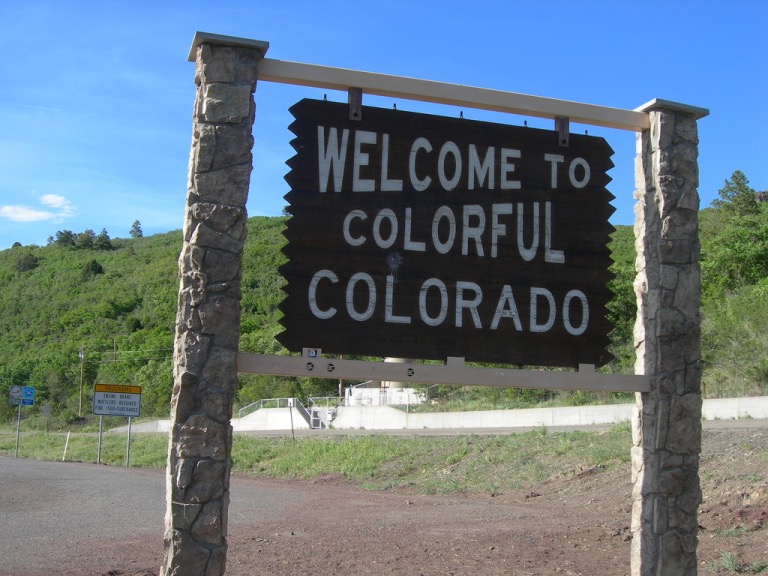Imagine standing atop a mountain peak, the crisp air biting at your cheeks, and the sprawling vista of the Rocky Mountains stretching before you. As you breathe in the freshness of the Colorado air, a question might flicker in your mind: why is this state known as “The Centennial State”? It’s a title that whispers of history, of milestones reached, and of a spirit that captures the essence of the American Dream. It’s a moniker that embodies the enduring spirit of a state that has weathered the storms of time and emerged strong — and it all began 150 years ago, with a vision to create a state that would be a symbol of unity and progress.

Image: www.starsinsider.com
The nickname, “The Centennial State,” isn’t simply a catchy slogan; it’s intimately woven into the very fabric of Colorado’s identity. It’s a label earned with pride, a tribute to a state forged in the crucible of history and shaped by the dreams and aspirations of its people. To truly understand why Colorado is called the Centennial State, we must delve into its fascinating past, the pivotal events that shaped its destiny, and the legacy that continues to inspire generations today.
A Birth Under the Banner of the Stars and Stripes
The year is 1876, a momentous year in American history — a century of independence since the signing of the Declaration of Independence. The nation is abuzz with celebrations and commemorations, a time of reflecting on the past and gazing optimistically towards the future. It is within this context that Colorado, a territory brimming with promise, takes its first steps towards statehood. On August 1, 1876, Colorado officially joins the Union, and in doing so, embraces the spirit of the centennial celebration. The “Centennial State,” a name that resonates with the national sentiment, is born.
However, the story of Colorado’s statehood isn’t a simple tale of joyous unification. The road to becoming a state was a winding one, paved with struggles and challenges. Prospectors, drawn by the glittering promise of gold, had flooded into the territory, seeking their fortunes. The Colorado Territory was a tumultuous place, a frontier on the edge of civilization, wrestling with issues of governance, law enforcement, and the ever-present tension between progress and the protection of the environment.
From Territory to State: A Triumphant Evolution
Yet, amid the chaos, there was a burgeoning sense of community, a desire to chart a brighter future. The people of Colorado, driven by a shared vision, began clamoring for statehood. They argued for the right to self-govern, for a voice in the halls of power in Washington D.C., and for the recognition and representation befitting a thriving population.
The path to statehood was fraught with obstacles. The U.S. Congress was divided on the issue. Some argued that Colorado was not yet ready, that its population and infrastructure were too underdeveloped. Others, particularly those from Colorado, countered that the territory was more than capable of governing itself and, in fact, had a vital role to play in the nation’s westward expansion.
A Victory for Self-Determination
Ultimately, the voices of those advocating for Colorado’s statehood prevailed. In 1876, the U.S. Congress approved the enabling act, paving the way for Colorado’s admission into the Union. The statehood celebration, held in Denver, was a grand affair, a moment of jubilation for the people of Colorado and a symbol of their unwavering spirit.
The moniker “Centennial State” became more than just a nickname; it became a deeply meaningful symbol. It was a reflection of Colorado taking its rightful place in the nation’s tapestry, a testament to the resilience of its people, and a declaration of their commitment to building a better future.

Image: www.sutori.com
The Centennial State: A Legacy of Pride
From its humble beginnings as a territory, Colorado transformed itself into a state that embraced its heritage while looking towards the future. The name “The Centennial State” has transcended its historical roots, becoming a source of pride for its residents. It symbolizes a unique connection with the nation’s history, a sense of unity and responsibility. It’s a reminder that progress is not a destination but a constant journey.
The spirit of the Centennial State is also evident in its natural beauty and its dedication to preserving its environment. The majestic Rocky Mountains, the vibrant canyons, and the sprawling grasslands are symbols of the state’s unique identity; a world full of natural wonders that attracts visitors from around the globe. The people of Colorado have always been deeply connected to their environment, understanding the importance of conservation and sustainable development.
A State of Innovation and Progress
Today, Colorado is recognized as a hub of innovation and entrepreneurship. Its vibrant cities and booming economy are fueled by a dynamic population that’s always pushing the boundaries of knowledge and discovery. From cutting-edge technology to sustainable energy solutions, Colorado is a state that embraces progress, always seeking ways to make a positive impact on the world.
The name “The Centennial State” also evokes a sense of optimism and forward-thinking. It inspires its people to not only look back at its past achievements, but also to dream big and strive for a better future. It reminds its residents of the importance of community, of working together, and of always striving for a better tomorrow.
Why Is Colorado Called The Centennial State
The Enduring Legacy of The Centennial State
So, the next time you find yourself in the breathtaking state of Colorado, soaking in its majestic landscapes and feeling the heartbeat of its vibrant cities, remember the story behind the name. “The Centennial State” isn’t merely a title — it’s a testament to the spirit of Colorado, a state that continues to embrace its heritage while boldly forging its own path in the world. It’s a state with a rich history, a vibrant present, and a promising future, a legacy built on the dreams of its people and the enduring allure of the Centennial State.






